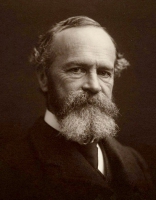| |
生平
威廉·詹姆斯在1842年1月11日出生於美國紐約州紐約,1861年就學於哈佛大學勞倫斯理學院。1864年進入哈佛醫學院與1869年獲得醫學博士學位。他患有嚴重的抑症候和心身性疾病,經常靠閱讀《聖經》來維持意志力。為休息和治療,曾到歐洲旅行。1878年結婚,健康狀況漸趨好轉。1875年成為哈佛心理學講師,講授解剖學和生理學。1876年到哈佛哲學任教,1907年離休。
專業
威廉·詹姆斯在法國受到他的教育,他的專業是心理學。當時心理學和哲學之間的分還不很大。到美國他一直在哈佛大學教書。雖然他不相信利用實驗可以研究人的心理,他是美國最早的實驗心理學家之一。
雖然他認為實踐是生活之路,但他不相信通過實踐人可以獲得客觀的真理。雖然每個人都是從生活的實踐中獲得他對世界的看法的,但詹姆斯認為,每個人從生活的實踐中獲得的看法是不同的,這是理所當然的。在這一點上他與約翰·杜威的看法不同。
信仰的實踐
詹姆斯在宗教哲學上也很有建樹。他列舉許多不同的“信仰的實踐”(1902年),使用他的實用主義的看法來會這些不同的實踐。他認為:
- 要研究一個宗教信仰,一個學者要研究這個宗教信仰的核心,而不必研究其組織結構。因為一個宗教的組織結構反映其核心的一小部分。
- 強烈的,甚至於病態的實踐經驗是心理學家的研究題目,而不是哲學家的研究題目。因為心理學家猶如心理的顯微鏡,他們可以極大地放大我們的日常生活。
- 要想真正地認識普遍存在的、被所有的實踐分享的、被歷史所證實的真理,一個人要取一個“超信仰”。這個超信仰是無法被實踐證實的,但它可以幫助一個人使他的生活變得更豐富和美好。
他被尊稱為美國心理學之父是“美國心靈學研究會”(1885年成立)的主要創立者,終其一生都在探討超個人的心理現象與超心理學,認為人的精神生活有不能以生物學概念加以解釋的地方,可透過某些現象來領會某“超越性價值”;強調人有巨大的潛能尚待開,人的意識衹有很少一部分為人所利用。他曾參與類似禪坐的靜坐活動,示靜坐是一種喚起深度意志力的方法,可以增加個人的活力與生命力,也做靈媒的實證研究。
此外,威廉橫跨哲學、心理學與精神醫學界,對超意識的自動書寫很感興趣,曾大量收集案例,發達現青少年最能此達內心的糾葛與人格之衝突,他還註意到自動書寫有時能解開罪犯的犯罪癥結,但非人人能自動書寫,必須透過催眠或其他方法。有趣的是,新時代大師《賽斯書》的作者珍·羅伯茲(Jane Roberts)曾收到過威廉死的信息,透過珍的自動書寫出版《一位美國作的死生存:威廉.詹姆斯的世界觀》(The Afterdeath Journal of an American Philosopher,1978)一書,此書除具有深度評論外,兼論美國歷史、心靈學、心理學與民主方面的問題。
著作
- 《心理學原理》1890
- 《信仰意志和通俗哲學請文集》1897
- 《人的不朽》1898
- 《宗教經驗之姓种种氏》1902 (The Varieties of Religious Experience)
- 《實用主義:某些舊思想方式的一個新名稱》1907
- 《多元的宇宙》1909
- 《真理的義意:實用主義的果》1909
- 《一些哲學問題:哲學導論的起點》1911
- 《徹底經驗主義論文集》1912
參考資料
- ^ William James: Writings 1878–1899. The Library of America. 1992-06-01 [2013-09-21].
- ^ William James: Writings 1902–1910. The Library of America. 1987-02-01 [2013-09-21].
- ^ Dr. Megan E. Bradley. William James. PSYography. Faculty.frostburg.edu. [2013-09-21]. (原始內容存檔於2014-11-24).
- ^ 黃金書屋---西方哲學史. www.phil.pku.edu.cn. [2019-02-27]. (原始內容存檔於2015-11-24).
William James (January 11, 1842 – August 26, 1910) was an American philosopher and psychologist, and the first educator to offer a psychology course in the United States. James is considered to be a leading thinker of the late nineteenth century, one of the most influential philosophers of the United States, and the "Father of American psychology".
Along with Charles Sanders Peirce, James established the philosophical school known as pragmatism, and is also cited as one of the founders of functional psychology. A Review of General Psychology analysis, published in 2002, ranked James as the 14th most eminent psychologist of the 20th century. A survey published in American Psychologist in 1991 ranked James's reputation in second place, after Wilhelm Wundt, who is widely regarded as the founder of experimental psychology. James also developed the philosophical perspective known as radical empiricism. James's work has influenced philosophers and academics such as Émile Durkheim, W. E. B. Du Bois, Edmund Husserl, Bertrand Russell, Ludwig Wittgenstein, Hilary Putnam, Richard Rorty, and Marilynne Robinson.
Born into a wealthy family, James was the son of the Swedenborgian theologian Henry James Sr. and the brother of both the prominent novelist Henry James and the diarist Alice James. James trained as a physician and taught anatomy at Harvard, but never practiced medicine. Instead he pursued his interests in psychology and then philosophy. James wrote widely on many topics, including epistemology, education, metaphysics, psychology, religion, and mysticism. Among his most influential books are The Principles of Psychology, a groundbreaking text in the field of psychology; Essays in Radical Empiricism, an important text in philosophy; and The Varieties of Religious Experience, an investigation of different forms of religious experience, including theories on mind-cure.
